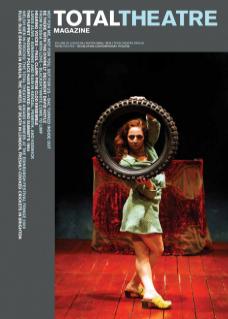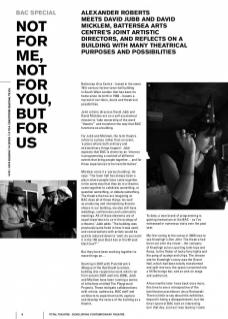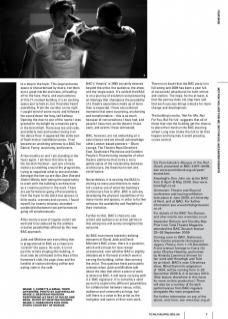Battersea Arts Centre – based in the same 19th century former town hall building in South West London that has been its home since its birth in 1980 – boasts a myriad of corridors, doors and theatrical possibilities.
Joint artistic directors David Jubb and David Micklem are on a self-proclaimed mission to ‘take ownership of the word “theatre”’ and transform the way that BAC functions as a building.
For Jubb and Micklem, the term theatre refers to a place rather than an event, ‘a place where both ordinary and extraordinary things happen’. Jubb explains that BAC is driven by an ‘interest in programming a cocktail of different events that bring people together… and for those experiences to be transformative’.
Micklem coins it a ‘porous building’. He says: ‘The town hall has always been a place where people have come together, in the same way that they do in a theatre; come together to celebrate something, or question something, or debate something. The theatre that we are imagining at BAC does all of those things. As well as producing and championing theatre shows in our building, we also still have weddings, conferences and community meetings. All of those elements are of equal importance to us in the ecology of a theatre.’ Jubb adds: ‘The building was previously quite fixed in how it was used, and conversations with artists would be quickly reduced down to ‘well, do you want it in the 150 seat black box or the 60 seat black box?”’
But they have been working together to move things on…
Starting in 2007 with Punchdrunk’s Masque of the Red Death (a whole-building site-responsive work which ran from autumn 2007 well into 2008), Jubb and Micklem have been running a series of initiatives entitled The Playground Projects. These instigate collaborations with artists, audiences, BAC staff and architects to experiment with, explore and develop the nature of the building as a theatre.
To date, a new brand of programming is gaining momentum at the BAC – as I’ve witnessed in numerous visits over the past year.
My first outing to the venue in 2009 was to see Kneehigh’s Don John. The theatre had burst out onto the street – the company of Kneehigh actors sporting tank-tops and flares, to the flicker of tacky fairy lights and the pong of scampi and chips. The chosen site for Kneehigh’s story was the Grand Hall, which had been totally transformed and split into two, the space converted into a 1970s lounge bar, and an end-on stage and auditorium.
A few months later I was back once more, this time to see a retrospective of the late theatre practitioner Jerzy Grotowski. There is little to say about this exhibition, beyond it being a disappointment, but the time I spent at BAC took an interesting turn that day. Just as I was leaving I came to a stop in the foyer. This large entrance space is characterised by doors, corridors and a great marble staircase, all leading off to the here, there, and everywheres of this 71-roomed building. It’s an exciting space just to look at, but I had also heard something. From the corridor on my right I caught wind of some music and followed the sound down the long, tall hallway. Opening the door to one of the rooms I was greeted to my delight by a massive party in the Grand Hall. There was tea and cake, and elderly men and women loving it on the dance floor. It appeared like some sort of flash mob or installation piece. I had become an unwitting witness to a BAC Tea Dance. Funny, surprising, and bizarre.
A few months on and I am standing in the foyer again. I am here this time to see the Scratch Festival – just one of many visitors scrambling around the programme, trying to negotiate what to see and when. Amongst the line-up are Non Zero One and Stolen Words, both taking the opportunity to work with the building’s architecture as a creative partner in the work. There are performances going off everywhere, from the foyer to the black box spaces, to little nooks, crannies and corners. I found myself, for twenty minutes, stranded – sandwiched between two performances going off simultaneously.
After nearly a year of regular visits I am well and truly seduced by the endless creative possibilities offered by this new BAC approach.
Jubb and Micklem see everything that is programmed at BAC as a chance to ‘scratch’ the space. As such, it is not just the artists shaping this building, it must also be attributed to the likes of the homework club, the yoga class and the handful of visitors drinking coffee and eating cake in the café.
BAC’s ‘theatre’ in 2009 certainly extends beyond the artist, the audience, the show and the single event. It’s evident that BAC is on a journey of evolution and pioneering an ideology that champions the possibility of a theatre experience made up of more than is expected. I have encountered moments that were surprising, enchanting and transformative – this is as much because of conversations I have had, and people I have met, as the theatre I have seen, and events I have witnessed.
BAC, however, are not embarking on a solo mission and we should acknowledge other London-based pioneers – Shunt Lounge, The Theatre Royal Stratford East, Southwark Playhouse and Camden People’s Theatre being examples of other theatre platforms that invite a more global sense of the relationship between architecture, the theatrical event and social space.
Nevertheless, it is exciting that BAC is inviting so many practitioners to make full creative use of what the building’s architecture has to offer. BAC is actively developing the physical capabilities of its many rooms and spaces, in order to further enhance the availability and flexibility of their invitation.
Further to that, BAC’s choice to use artists and audience as active parties in this enterprise will surely strengthen the outcome.
As BAC now moves towards realising elements of David Jubb and David Micklem’s BAC vision, there is a question, which will at least for now remain unanswered, over whether BAC is slightly imbalanced in the level at which work is serving the building, rather than serving the artist. This question feels particularly relevant when Jubb and Micklem talk about the idea that when a piece of work is shown at BAC, it will leave carrying with it a ‘BAC signature’. It is certainly a valid pursuit to explore the different possibilities for collaboration between venue, artist, audience and community at large, but still there is a value to the artist as the instigator and owner of their own work.
There is no doubt that the BAC party is in full swing and 2009 has been a year full of successful adventures for both artists and visitors. The hope, for me at least, is that the journey does not stop here and that each success brings a desire for more change and development.
The building’s motto, ‘Not For Me, Not For You, But For Us’, suggests that all of those that visit the building get the chance to place their hand on the BAC steering wheel. Long may it take the risk to let that happen and long may it avoid pressing cruise control.
For Punchdrunk’s Masque of the Red Death, presented at BAC 2007–2008, see www.punchdrunk.org.uk/past/ tmotrd.htm
Kneehigh’s Don John ran at the BAC from 9 April–8 May 2009. See www. kneehigh.co.uk
Grotowski: Theatre and Beyond conference and touring exhibition took place in June 2009, at University of Kent, and at BAC. For further information see www.britishgrotowski. co.uk
For details of the BAC Tea Dances and oher events see www.bac.co.uk
Alexander Roberts and Dorothy Max Prior from Total Theatre Magazine attended the BAC Scratch festival 25–26 September 2009
Coming soon to BAC: Battersea Arts Centre presents Homotopia’s Jiggery Pokery, from 1–19 December. A one-woman homage to Carry On actor Charles Hawtrey, performed by Amanda Lawrence (known for her work with Kneehigh and Told by an Idiot). BAC’s main Christmas show, Blind Summit’s adaptation of 1984, will be running from 2–23 December 2009 & 4–9 January 2010. (See feature elsewhere in this issue for more on this production.) There will also be a number of Scratch performances from BAC regulars alongside this main programme. For further information on any of the above, and more, see www.bac.org.uk


